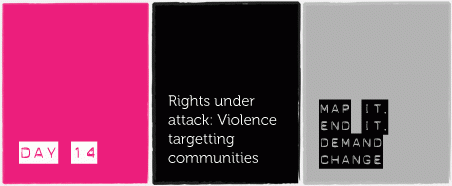
The UN Special Rapporteur on Freedom of Expression and Opinion centred the importance of the internet in enabling a broad range of human rights. We have seen this through the multiple, strategic and creative ways that feminist and human rights activists have mobilised for action through online spaces. From petitions, information sharing, alerts, documentation, creative activism to community building and mobilisation and more, the democratising potential of the internet has been compellingly leveraged for social, economic, cultural and political transformation.
For sections of society who have little access to other kinds of public spheres because of the multiple forms of discrimination that they face, the internet is a particularly valuable space and platform for change. It can amplify marginalised perspectives, make silenced experiences visible and bring together people with shared concerns or identities in a relatively safer space to advocate for change [http://erotics.apc.org].
However, even as the internet opens up new spaces for public and political engagement for women and girls, their rights come under attack. Women's rights organisations and feminist activists have had their online spaces hacked because of their stance on feminism and gender equality. Women bloggers who are outspoken about discrimination face overwhelming attacks and messages that aim to disrupt their ability to express themselves online, including comments that attack their gender and sexuality, with threats of violence and rape, as well as photomontages that depict them in violent and degrading ways.
Online communities formed to safely explore, defend and promote sexual rights have been blocked, hacked and infiltrated for surveillance and harassment by state and non-state actors, including self-proclaimed defenders of internet rights such as anonymous hacker groups. At the same time, social networking platforms have been used to create groups and online expressions that target hate, intolerance and violence towards groups of people because of their gender or sexual identity, including transgenders, pro-choice advocates and lesbians.
Efforts to monitor and assess the threats to freedom of expression, information, opinion and assembly on the internet rarely includes a feminist perspective that focusses on the issue of online harassment and technology-related violence against women. Defend our right to communicate freely and safely online. Take back the tech! Map it. Make it visible. And demand for change.
1) MAP IT
- Do you know of incidences when websites created by women's rights organisations, sexual rights advocates, feminist activists or bloggers have been hacked, blocked or deleted?
- Triggers for such online attacks can include during times of elections, national debates on issues related to women's rights, especially on their sexual rights and right to bodily and individual autonomy, or when there is a push for internet regulation in the name of protecting public morality, such as the blocking of LGBT sites for being "pornographic".
- Put them on the agenda for the defence of internet rights. Add them to the TBTT map!
- If the site in question is currently down, capture a printscreen and add it to your report.
- Click on "Submit a report".
- Write a description of the space and what happened. Note especially contextual events that might have played a role.
- Tick "Violence targetted at communities" under the "under the “Type of VAW” category, and tick other options where applicable.
- Mark on the map the region the site is focussing on, or if it is global, the town/city where you are (do not write your home address or street address, just a broad area or landmark will do).
- Upload the printscreen as part of your report.
2) SHARE YOUR STORY
- Have you ever experienced being harassed or attacked online because of your gender, sexuality or feminist position?
- Or has your own online accounts and spaces been targetted and compromised because of your opinions and position on issues related to women's rights, gender and sexuality?
- Add your story to the map by submitting a report using the same steps above.
- Check the map for reports of cases and read the stories.
- Extend your support by leaving a comment, or by sharing your own experience.
Put online violence that targets feminist voices on the map. Demand for recognition, call for action and defend our right to participate freely and safely on the internet!
- Log in to post comments
